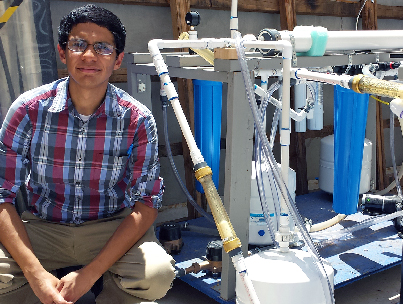By Daniel Perez
UTEP News Service
Editor’s note: This is the fourth story in a series highlighting a few of the interdisciplinary research projects at UTEP making an impact in the community, across the region and around the globe.
Several dozen residents of El Paso-area colonias are working with a quintet of interdisciplinary university researchers to install a useful and economic water treatment device in their homes that they hope homeowners will trust and continue to use after the study is completed.
Faculty and students from The University of Texas at El Paso and New Mexico State University (NMSU) have joined for this $500,000 Environmental Protection Agency STAR grant that also will check water quality in the wells and storage tanks serving these East El Paso and Southern New Mexico communities. STAR stands for Science to Achieve Results.

Three UTEP civil engineering professors will review the existence of water contaminants and determine the best over-the-counter system to use, and two NMSU health psychologists will work with the residents to study their level of confidence in the system and the drinking water it produces.
The three-year study began in winter 2012 with community focus groups. These were followed by home visits where researchers took water samples and received additional feedback.
Shane Walker, Ph.D., assistant professor of civil engineering and principal investigator, said the project moves into its implementation phase this summer. The main thing that surprised Walker, who has studied water treatment since 2006, was residents didn’t just want a system that worked, but one without stigma.
“We wanted a solution that was environmentally and technically feasible, and (residents) wanted a solution that was economically viable and socially acceptable,” he said.
Walker said he developed the concept during a brainstorming session with William Hargrove, Ph.D., director of UTEP’s Center for Environmental Resource Management, or CERM. They discussed water issues that impact nearby colonias – communities along the U.S.-Mexico border that often lack basic infrastructure such as paved roads and connections to municipal utilities. Walker had participated in two humanitarian missions in 2010 and 2011 to improve water quality in Ecuador using simple but effective water purification devices. The program was well received, so he thought the same could be done in the colonias.
Hargrove suggested an additional behavioral component because people have to be willing to use the technologies being developed. He said the public health aspect of the program gives people the reason why they should care about their water and what they can do about it.
He said CERM has conducted studies showing how better water quality decreases the number and seriousness of gastrointestinal illnesses and skin problems that affect the quality of life. He referred to one study in Vinton, Texas, where residents who rely on well water had twice the prevalence of gastrointestinal illnesses and skin ailments compared to residents of Westway, a community a half mile away that is served by El Paso Water Utilities.
“Hopefully the study will result in an effective technology residents can implement that is affordable and manageable,” Hargrove said.
Walker’s team is made up of Ivonne Santiago, Ph.D., clinical professor of civil engineering; and John Walton, Ph.D., professor of civil engineering. Both also have environmental experience. Walker also reached out to Joe Tomaka, Ph.D., a former longtime UTEP health promotion faculty member who recently became associate dean for research in NMSU’s College of Health and Social Services. Tomaka brought in Becky Palacios, Ph.D., assistant professor of public health sciences at NMSU.
Tomaka said the opportunity to interact with colonia residents and improve their quality of life was among the reasons that he and Palacios joined this interdisciplinary public health project.
“We also have learned that there are no easy solutions to these problems, sans the expansion of the municipal water system to these homes,” Tomaka said. “All (point of use) filtration systems – even simple ones – require regular maintenance in order to be effective. We will have to ensure that we properly educate and empower the individuals we work with in the coming year to perform such maintenance.”
The team also includes three UTEP students from civil engineering and public health. They will revisit the colonia families to help install the water treatment systems that should improve their water quality.
The experience gives doctoral student Isaac Campos a sense of déjà vu. When he was growing up, his family dealt with many of the same issues in Juárez.
Campos said his family did not trust the tap water and that mentality is shared by many residents of the approximately 35 colonia homes he visited. He said many of the water samples from those homes had bacteria or algae. Part of the project was learning which chemicals would remove bacteria without hurting the residents.
He planned to revisit those homeowners starting in July to install the systems with their help. The thinking is the resident might trust the system more if they have a hand in its installation. The goal is to provide them a steady supply of drinkable water so they can redirect the money spent on bottled water.
“We could install the system, but there has to be some sweat equity involved so the homeowner will value the system,” said Campos, who earned his bachelor’s degree in civil engineering from UTEP in 2011. “If we just ride in on a white horse and do it for them, they don’t take ownership. They need to know how the filter works and how easy the parts are to replace.”
The students have tested five systems created with components purchased from local hardware stores that would be accessible to colonia residents. The sets, which range in price from just under $300 to less than $50, are being tested with contaminants found in colonia water.